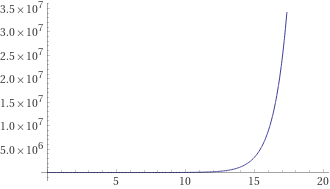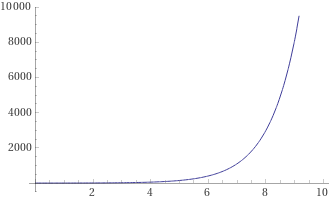Recently I've been reading "Guns Germs and Steel" - a book that tries to explain human development while ignoring, well, human history. It's a fascinating approach that looks at differences of geography and so on. Early in the book is it presents the fact that sometime around 40-50,000 years ago, humans suddenly got "a lot more interesting" and went from producing generic stone tools to producing specialized stone and bone tools. The author presents the idea that this is because humans suddenly evolved sufficiently advanced voice boxes to communicate. I think he's almost right, but I don't think it was evolution that suddenly gave humans the ability to speak, for reasons I'll go into in a minute.
We commonly represent technological growth as an exponential curve.
Here's what one looks like:
 Seems like all the interesting things happen recently eh? If you were
to read the X axis as "thousands of years", then all the interesting
stuff happened in the past couple thousand years. I mean, the stuff
on the left is just so flat! But if we zoom in the graph on that
flat bit, we see:
Seems like all the interesting things happen recently eh? If you were
to read the X axis as "thousands of years", then all the interesting
stuff happened in the past couple thousand years. I mean, the stuff
on the left is just so flat! But if we zoom in the graph on that
flat bit, we see:
 Oh my goodness! It looks the same! This is the nature of an exponential
curve, and it has some interesting implications.
Oh my goodness! It looks the same! This is the nature of an exponential
curve, and it has some interesting implications.
Because growth is an exponential curve, there are always interesting things happening recently while history stretches on looking much the same for thousands of years before. But if we dig around, maybe we can see some of those "oh my goodness" moments that show that the exciting stuff happens all the time, and it always happens recently.
- Oh my goodness, we just figured out how to draw a map and represent spatial information on paper. Now people aren't going to get lost anymore
- Oh my goodness, we just figured out how to store seed over winter. Now we're not going to starve
- Oh my goodness, we just figured out how to tan leather. Now our clothing is going to last a lot longer and we aren't going to freeze
But the most fundamental of all human technologies is this: the ability to pass on information from one human to another. Internet, TV, Film, Radio, Telegraph, Photos, Postal services, Letters, Scrolls, Basic Literacy. Then down the bottom there things start getting murky. What came before writing and literacy? Well, at some point people learned to speak, but in terms of information transfer, they also learned how to teach. As far as we know, humans have no innate instinct for speech. All speech is passed down from parent to child. As a result, humans had to develop the ability to teach and to speak!
So what are some "oh my goodness" moments from this time in history:
- Oh my goodness, we just realized we could use different words for food vs being hungry!
- Oh my goodness, we just realized we could use different words to distinguish between when I'm referring to myself compared to when I'm referring to you
- Oh my goodness, we just realized we could use different words to imply an action is in the past, present or future
Another significant part is the passing on of knowledge. As far as I can tell this probably started with passing on of language. But maybe it started out with passing on of mechanical skills and language evolved to better support it. Or more likely they developed somewhat in parallel. Consider what it takes to teach someone how to make a stone tool. You can demonstrate how to grind the edge of a stone against another one, and (because you can't speak), hope that they get the idea that they should copy you. Or maybe you want to pass on stone knapping. If you don't have language, it is likely hard to convey that you should put pressure on this part of the rock not that part of the rock. So to go from rubbing stones together to shaping tools with the technology of knapping it requires a development in language sufficient to describe these ideas.
Passing on skills also requires the development of the idea that skills should be passed from one human to another. Consider teaching a dog to shake hands. Just because you teach your dog how to do that for a treat doesn't mean it's going to teach it's puppies how to shake hands. As far as we know, dogs don't have the idea of passing on that particular mechanical skill.
I had a brief read through wikipedias page on tool use in animals, and one that I find fascinating is chimpanzee's using grass and twigs to fish for termites in termite mounts, and this behaviour is being continued. The development of this behavior is HUGE to an early culture as it allows those chimpanzee's to gather more food faster and it shows they have some capacity to teach. Do you not think that at some point early humans developed the same technology, and by passing it on to our children, they were able to develop new and better things? This skill can be transferred purely through observation, so I wonder at what point language is required?
Of course, the question is: is there any evidence for this? Unfortunately you don't find fossilized words or behaviors alongside the fossilized tools, so it's likely to remain a mystery unless someone makes a time machine or unless we are patient enough to watch another animal species develop these skills.
So going back to the book "Guns Germs and Steel" what do I think happened 40-50,000 years ago when human history "suddenly" got a lot more interesting in terms of artifacts? I don't think it was the evolution of a voice box. Humans can learn to communicate by timed beeps (morse code), by tactile feeling (braille) and hundreds of other methods. So even without a voice box at all, I think technological development can happen. Instead I think that was when language was sufficiently developed such that complex mechanical skills could be described and passed from one person to another.